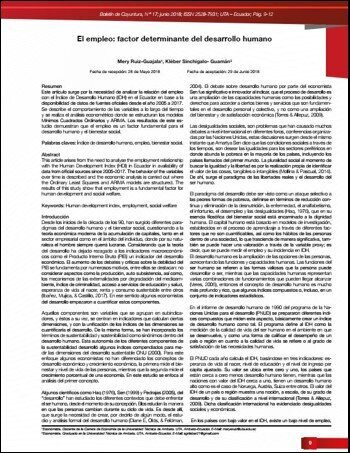Employment: a determining factor in human development
Main Article Content
Abstract
This article arises from the need to analyse the employment relationship with the Human Development Index (HDI) in Ecuador in availability of data from official sources since 2005-2017. The behavior of the variables over time is described and the economic analysis is carried out where the Ordinary Least Squares and ARIMA models are structured. The results of this study show that employment is a fundamental factor for human development and social welfare.
DOI: https://doi.org/10.31164/bcoyu.17.2018.666
URL: http://revistas.uta.edu.ec/erevista/index.php/bcoyu/article/view/666
Downloads
Article Details

This work is licensed under a Creative Commons Attribution-NonCommercial 4.0 International License.
![]()
The publications of the Boletín de Coyuntura are licensed under a Creative Commons Attribution-NonCommercial 4.0 International License (CC BY-NC 4.0). The Universidad Técnica de Ambato retains the copyright of the published works, and favors and allows the reuse of these, as long as: the authorship and original source of publication is cited, and they are not used for commercial or onerous purposes. The intellectual property of the published articles belongs to the authors.
References
BCE. (2016). Banco Central del Ecuador. Obtenido de Banco central del Ecuador: https://www.bce.fin.ec/index.php/informacion-estadistica-1
CEPAL. (2000). Panorama social de América Latina 1999-2000. Chile: Comisión Económica para América Latina y el Caribe.
Diane E, p., Olds, S. W., & Feldman, R. D. (2004). Desarrollo Humano. México D.F: TheMGraw-Hill.
Granados, R. M. (marzo de 2013). Test de causalidad. Obtenido de Test de causalidad: http://www.ugr.es/~montero/matematicas/causalidad.pdf
Gujarati, D., & Porter, D. (2009). Econometría (Quinta edición ed.). (M. Toledo, J. Chacón, E. Zúñiga, Edits., & P. Villarreal, Trad.) México FD: McGraw-Hill/Irwin, Inc.
Haq, M. u. (1976). The Poverty Curtain. New York: Columbian University Press.Ibañez, N., Mujica, M., & Castillo, R. (2017). Componentes Del Desarrollo Humano Sustentable. Revista Científica Electrónica de Ciencias Gerenciales (36), 63/77.
INEC. (21 de 05 de 2018). Obtenido de Instituto Nacional de Estadística y Censo: http://www.ecuadorencifras.gob.ec/vdatos/
Maddala, G. (1992). Intruduction to econometrics. (second ed.). New York.: MacMillan Publishing Company.
Mollina, R., & Pascual, J. (2014). El Índiice De Desarrollo Humano Como indicador Social. Revista Crítica de Ciencias Sociales y Jurídicas (44), 1-18.
OIT. (2013). La Revista Internacional del Trabajo y la OIT. Fragmentos de su Historia. Revista Internacional del Trabajo, 132(Extraordinario), 1-120.
Pedrajas, M. (2005). El Desarrollo Humano en la Economía Ética de Amartya Sen (Tesis Doctoral). Valencia: Universitat de València Servei de publicacions.
Pérez, L., & Mora, J. (2014). La calidad del empleo en la población afrodescendiente colombiana: una aproximación desde la ubicación geográfica de la comuna. Revista de Economía del Rosario, 17(2), 117-149.
PNUD. (2017). Informe sobre Desarrollo sobre el Desarrollo Humano 2016. Nueva York, NY 10017, Estados Unidos: Lowe-Martin Group. Obtenido de http://hdr.undp.org/sites/default/files/HDR2016_SP_Overview_Web.pdf
Sen, A. (1999). Desarrollo y Libertad. Barcelona: Planeta S.A.
Solera, Á. (2000). Criterio para selección de Modelos Econométricos. Banco Central de Costa Rica. Departamento de Investigación Económica., 1-17. Obtenido de http://www.bccr.fi.cr/ndie/NT-07-2000.PDF
Stiglitz, J. (2002). Empleo, justicia social y bienestar de la sociedad. Revista Internacional del Trabajo, 121(1-2), 9-31.
Tinbergen, J. (2013). Política comercial y crecimiento del empleo. Revista Internacional del Trabajo, 132(extraordinario), 491-497.
Torres, T., & Allepuz, R. (2009). El desarrollo humano: perfiles y perspectivas futuras. Estudios de Economía Aplicada, 27(2), 545-562.
Veres, E. (2006). Diseño de un índice para la medición del desarrollo humano. Estudios de Economía Aplicada, 24(3), 1013-1042.


